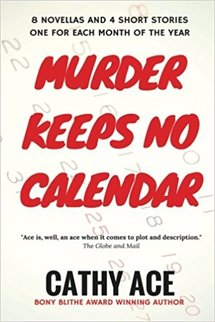 I had not intended to review another story from Cathy Ace's Murder Keeps No Calendar anthology, until I read The Corpse with the Fake Purse. Fans of Ace's Cait Morgan will recognize the title in the same style as her mystery series. This short story features the Welsh university professor living in Canada, and shows why the series is popular. Set in June, Morgan is giving a lecture to a group of police officers on victimology - developing a profile of victims to assist with solving a crime. She is put on the spot by Chief Superintendent Dufray, who seems intent upon both disproving her technique and making her appear foolish. Dufray has stationed a young constable at a murder scene. He is streamed into the lecture hall via webcam. The proposition is for Cait to view the apartment, then deliver both a victim profile, and surmise the identity of the killer. Cait resent being publicly put in this position, and imagines the pleasure of putting Dufray through a wood chipper. Pressured into the challenge, she directs the constable to different rooms, asking him to show her the victim's possessions. The way Cait reveals the victim's personality and lifestyle is fascinating. All this would make a good story, but Ace pushes it to a higher level with the way in which Morgan reveals herself as much as the victim. If you're already a Cathy Ace fan, this short story will confirm why you enjoy the novels. If you haven't yet read her longer work, let this story serve as your invitation to some entertaining reading.
0 Comments
2/20/2018 0 Comments White Like Her - Gail Lukasik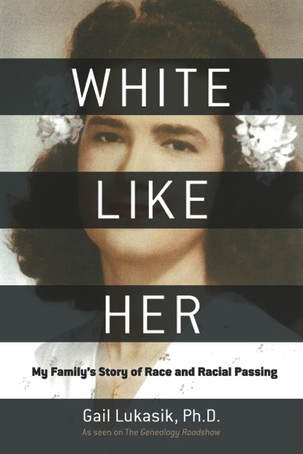 The exploding popularity of home DNA testing kits makes a book like this required reading. For many people, family history is reliably passed down through the generations. For others, like my family, the DNA test reveals surprises. Author Gail Lukasik learned stunning news about her mother's ancestry while researching family genealogy. A later DNA test confirmed the revelation. I recently read White Like Her - My Family's Story of Race and Racial Passing. She deals with great sensitivity and compassion her mother's decision in the early 1940s to pass for white. Also covered in depth is the history of racial passing, which was fascinating. Lukasik's book has captured the attention of genealogy fans and students of racial history in America. Her journey led her to the television program Genealogy Roadshow, and most recently an appearance on the Megyn Kelly Show (link below). Lukasik generously agreed to appear on my blog, with an excerpt from an article about her book and her journey. My Mother Passed as White—Even to Me By Gail Lukasik Excerpt from The Daily Beast, October 29, 2017 My mother leans toward the mirror. With graceful upward strokes she applies liquid foundation to her face, and begins her day as a white woman. I perch on the edge of the blue bathtub, watching in fascination as she transforms her olive skin to a lighter shade. At 14, I have no inkling of the depth of her deception. Nor the risks she takes everyday married to my white father and living in a white, lower middle class Cleveland suburb. It’s 1960. Seven years before the Supreme Court declares interracial marriage legal. She knows what’s at stake. Her enactment is so artful, so practiced; my father will go to his grave, thinking he married a white woman. “Why do you wear makeup to bed?” I’m starting to question my mother’s quirky habits, starting to wonder about the blank spaces in her New Orleans family tree. Her answer leaves me bewildered and troubled. “You never know if you’ll get sick in the night and have to be taken to the hospital. You want to look your best.” It’ll be three decades before I understand that to my mother “best” means white. It’ll be three decades before I discover my mother passed for white. There were clues I missed. Her strict avoidance of the sun, her absence of family photographs, her unwillingness to visit her family in New Orleans, and her obsession with her make-up. If not for my curiosity about my mother’s father, Azemar Frederic, my mother would have died with her racial secret intact. In 1995, while scrolling through the 1900 Louisiana census records searching for Azemar, I made a startling discovery. Azemar and his entire family were designated black. In an instant my sense of self was shattered. When I questioned her, she vowed me to secrecy until her death. “How will I hold my head up with my friends?” she pleaded. I’d never seen my mother so afraid. Reluctantly, I kept her racial secret for 17 years. And in the silence of those years, I was left confused over my racial identity. A year after my mother’s death, I appeared on PBS’ Genealogy Roadshow and revealed to 1.5 million people that my mother passed for white. On the 1940 Louisiana census my mother, Alvera Frederic, was listed as Negro, working in a teashop in New Orleans. Four years later, she moved north and married my white father. She was never classified as Negro again. *** Gail Lukasik is the author of White Like Her: My Family’s Story of Race and Racial Passing. The Washington Post named White Like Her one of the most inspiring stories of 2017. After her 2015 appearance on PBS’ Genealogy Roadshow where her mother’s life changing secret was revealed, she was inspired to write White Like Her. The book is the story of her mother’s “passing” for white, her struggle with the shame of mother’s choice, and her subsequent journey of self-discovery and redemption. She also writes the award-winning Leigh Girard mystery series, a seasonal series set in Door County, Wisconsin. Peak Season for Murder won the Lovey Award for Best Traditional Amateur Sleuth. Her website is: www.gaillukasik.com. White Like Her is available at: https://www.amazon.com/White-Like-Her-Familys-Passing/dp/1510724125 Megyn Kelly Show appearance: https://www.youtube.com/watch?v=oNiEBnOzgVw 2/13/2018 0 Comments Sister in Crime: Interview at ALA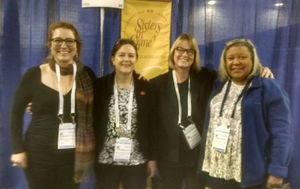 Jennifer Kincheloe, Catherine Dilts, Sue Hinkin, Cordia Booth Jennifer Kincheloe, Catherine Dilts, Sue Hinkin, Cordia Booth Sunday morning I volunteered at the Sisters in Crime table at the American Library Association convention in Denver, Colorado. I had fun with my Sisters meeting librarians, readers, and vendors as I promoted SinC and handed out free books from our authors. Unexpectedly, we were approached by entrepreneur Alan Bourgeois, who is seeking to interview 1000 authors in a year. Springing impromptu interviews on introverted authors is a tricky business! We managed to remain relatively composed. Here is my interview: Catherine Dilts You can find interviews with other Sisters in Crime members who attended the ALA here: 1000 Authors 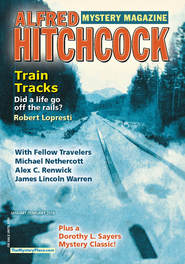 Go For the Juggler by John H. Dirckx appeared in the Alfred Hitchcock Mystery Magazine January-February 2018 issue. I was happy to see Detectives Dollinger and Auburn again, Dirckx's recurring short story characters. A man is murdered. At first it seems a simple matter of robbery, but unexpected hints suggest Myron Wendling was not the gray little man he appeared to be. The fun is watching how the detectives sort out the clues step by step, until they arrive at the solution. 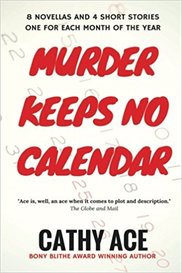 APRIL: Negroni is the fourth entry in Cathy Ace's Murder Keeps No Calendar anthology. Negroni is an Italian cocktail, and Ace serves up a tasty one in this story. The premise is highly improbable yet completely charming, as fish and chips shop owner Doug wins the lottery and goes on an Italian holiday. He becomes entangled with a beautiful woman in distress, and feels compelled to shed his usual reticent nature to help her. I especially loved the scene toward the end with the police in the grotto. This was a fun read. 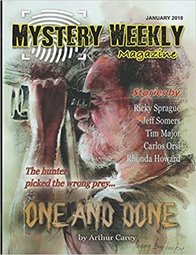 The Adventure of the Dead Frog, by Carlos Orsi, is in the Mystery Weekly Magazine January 2018 issue. Roberto has found what he thinks is a rare frog. When it is stolen from a research lab safe, Roberto and his girlfriend try to solve the locked room mystery. 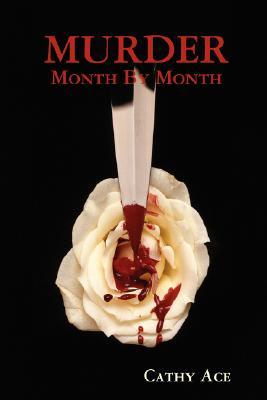 I began reading Murder: Month by Month, by Cathy Ace. I have read several novels in Ace's Cait Morgan Mystery series, so I was curious about her ability with the short fiction form. The anthology follows the calendar, opening with January. This is a creepy little tale told through diary entries as a woman plots the murder of her husband. I read the story aloud on a road trip. Both my husband and I figured out something was not quite right fairly early in the story, but what that something was came as a surprise. Cait Morgan appears in February, when a student shows up in her university office. Paris Chow asks her advice for a murder mystery story he wants to tell as part of the Chinese New Year celebration. Cait suspects the story is not fiction, but listens to the end of his tale. Paris is more interested in who didn't do it than who committed the murder. Fans of Cait Morgan will enjoy seeing her in this short story. Anthologies are nice because you can set them down, picking them up whenever you have time for a story. There's no loss of continuity. I am looking forward to following the calendar with more of Cathy Ace's entertaining mystery stories. |
Subscribe to this blog: |
Proudly powered by Weebly
 RSS Feed
RSS Feed